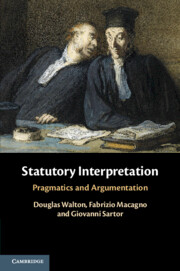Book contents
- Statutory Interpretation
- Statutory Interpretation
- Copyright page
- Dedication
- Contents
- Figures
- Tables
- Acknowledgments
- Introduction
- 1 Interpretation and Statutory Interpretation
- 2 Statutory Interpretation as Problem Solving
- 3 Interpretation and Pragmatics – Legal Ambiguity
- 4 Pragmatic Maxims and Presumptions in Legal Interpretation
- 5 Arguments of Statutory Interpretation and Argumentation Schemes
- 6 Classification and Formalization of Interpretative Schemes
- References
6 - Classification and Formalization of Interpretative Schemes
Published online by Cambridge University Press: 29 December 2020
- Statutory Interpretation
- Statutory Interpretation
- Copyright page
- Dedication
- Contents
- Figures
- Tables
- Acknowledgments
- Introduction
- 1 Interpretation and Statutory Interpretation
- 2 Statutory Interpretation as Problem Solving
- 3 Interpretation and Pragmatics – Legal Ambiguity
- 4 Pragmatic Maxims and Presumptions in Legal Interpretation
- 5 Arguments of Statutory Interpretation and Argumentation Schemes
- 6 Classification and Formalization of Interpretative Schemes
- References
Summary
In our previous chapters, we underscored the role of interpretative arguments in the justification of the passage from a legal text to a legal rule (Hage, 1996, 214; Tarello, 1980), where the latter is intended as a normative premise under which an individual case can be “subsumed” or classified (Moreso & Chilovi, 2018). Legal interpretation can be compared to the common understanding and processing of utterances in ordinary conversation (Smolka & Pirker, 2016), in which semantic content is only a vehicle for getting to the “speaker’s meaning,” i.e., what is communicated – a richer content to which semantic “meaning and obvious background assumptions have both contributed” (Soames, 2008, 411; see also Butler, 2016; Carston, 2013; Horn, 1995; Miller, 1990).
- Type
- Chapter
- Information
- Statutory InterpretationPragmatics and Argumentation, pp. 280 - 332Publisher: Cambridge University PressPrint publication year: 2021
References
References
Cases Cited
Dunnachie v. Kingston-upon-Hull City Council 2004 UKHL 36.
Johnson v. Unisys Limited 2001 UKHL 13.
Norton Tool Co. v. Tewson [1973] 1 WLR 45.
R. v. Barnet London Borough Council [2004] 1 All ER 97.
- 1
- Cited by

